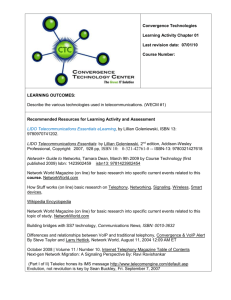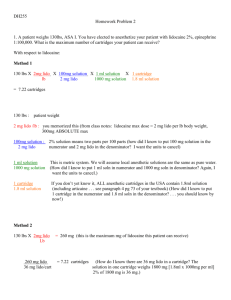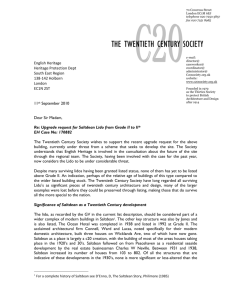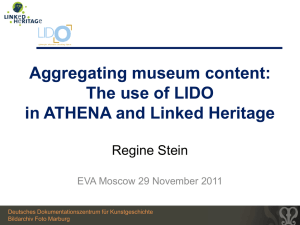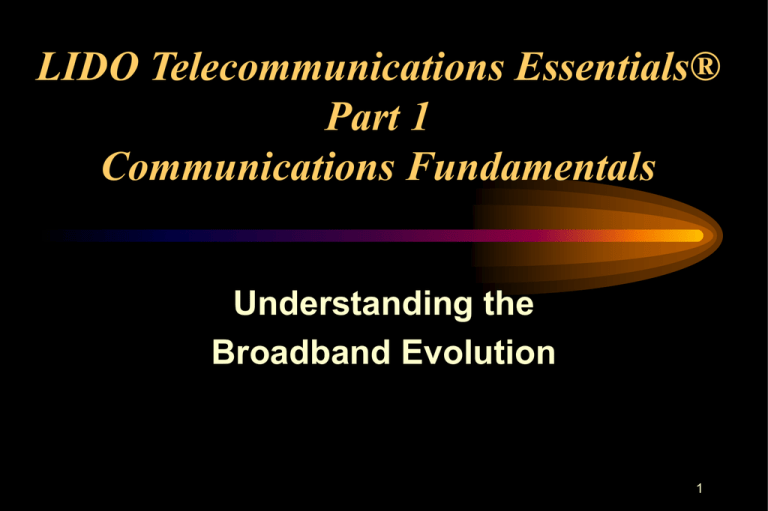
LIDO Telecommunications Essentials®
Part 1
Communications Fundamentals
Understanding the
Broadband Evolution
1
Summary
•
•
•
•
•
(from p. 17)
Bandwidth
Types of Applications
(p. 106/107)
IGMeeting Demo
2
Measurements of the Digital World
• Processing power
– Measured in number of transistors and operations per
second
• Digital storage
– Measured in Bytes (B)
• 1 Byte = 8 bits = single character (letter “A”, number “2”, etc)
• Digital data transmission
– Measured in bits per second (bps)
LIDO
3
The Power of the Processor
• Today’s transistors are about a micrometer in
overall length: dozens of them could sit on
top of a human red blood cell.
• This very success is bringing chipmakers to
the brink of a new, steep obstacle to further
gains in performance.
• The problem lies in the tiny metal wires that
weave the transistors into integrated circuits.
LIDO
4
The Power of the Processor
• The Intel 130-nm
Pentium 4 processor
has
– 55 million transistors
and
– uses roughly 4.8 km
of interconnects to
support each square
centimeter of its
circuitry
LIDO
5
The Awful Truth About Moore’s Law
• With the introduction of 90-nm microprocessors the chips will house 110 million transistors and
nearly 6.9 km of interconnects per square
centimeter.
• The narrower the wire, the longer it takes a signal to
propagate along it.
• Today’s most advanced ICs, switch up to 10 billion
times a second, and their metal interconnects can
barely keep up.
LIDO
6
The Awful Truth About Moore’s Law
• Each new generation of chips only makes the
situation worse
• The good news is that the industry is working
on solutions
• Two main approaches are emerging.
LIDO
7
The Awful Truth About Moore’s Law
• One is designed to change the propagation
characteristics of those tiny on-chip transmission
lines.
– low-k dielectric film
• The more significant development comes from
Intel’s recent reports of the successful
demonstration of the first continuous all-silicon
laser.
– Optical connections can carry thousands of times more
data per second than copper wires can
8
Moore’s Law and Telecommunications
• On the positive side, thanks to Moore’s Law,
network endpoints today are small, powerful,
inexpensive devices.
• With such power in the endpoints, the need
to embed the functions of a network in the
network’s core shrink.
• In addition, smart end devices can set up and
manage calls far better than a centralized
network.
LIDO
9
Advanced Applications
•
•
•
•
•
•
•
•
•
LIDO
Simulation of blood flow in the human body
Space weather modeling
Virtual tests for therapeutic cancer drugs
Global modeling of the Earth’s magnetosphere
Simulations of shock waves and eddies in turbulent
fluids
Large-scale structure of galaxies and galaxy
clusters
Modeling the interaction of proteins within individual
cells
Studying instability and turbulence in plasmas
Testing models of the formation of cosmological
10
structures
Storage Requirements
• 1.5 KB (12,000 bits)
– One double-spaced typewritten page
• 1 MB (Megabyte) can store
–
–
–
–
–
–
One long novel, stored as text
One full-page black-and-white image
One 3 x 5 inch color picture
2 minutes of telephone-quality sound
7 seconds of CD-quality sound
0.04 seconds of broadcast-quality video
• 4 GB (Gigabyte)
– One feature-length film
– High-definition movies use 6x the storage space of traditional movies.
LIDO•
1TB (Terabyte)
– 250 full-length films
11
Storage Media
• CD-ROM capacity = 650 MB
• DVD capacity = 4.6 GB to 17 GB
– Transfer rate of 600 Kbps to 1.3 Mbps
•
•
•
•
LIDO
Bacterial Protein Memory
Holographic Storage Systems
Rotaxanes
Magnetic Sensors
12
Storage Developments
Cuvette size =
1x1x3 cm
Capacity = Terabytes
Library of Congress,
(about 10 TeraBytes!!)
LIDO
13
Storage Developments
• Holostore Technology
– Full scale optical computing environments require
memories with rapid access time and large storage
capacity.
– Holography technology achieves the necessary
high storage densities as well as fast access times.
– Holographic data storage enables discs the same
size as today’s DVDs to store than 1TB of data.
LIDO
14
Storage Developments
• Rotaxanes
– A memory subsystem that uses molecules to
store digital bits.
– Researchers have made a new molecular device
that could store up to 100 gigabits of data per
square inch.
– Could be used as switchable components for
artificial machines.
LIDO
15
Storage Developments
• Tiny magnetic sensors, microscopic whiskers
of nickel only a few atoms wide are capable
of detecting extremely weak magnetic fields.
• The high degree of sensitivity means terabits
of data -- or trillions of bits -- could be
crammed into a square inch of disk space.
LIDO
16
Bandwidth Definition
• The term itself comes from the radio realm,
and the visualization of the electromagnetic
spectrum, where the spectrum is divided into
“bands”.
• The bands, and the channels within them,
have a “width” expressed in Hertz (cycles per
second).
• The wider the band, the more information it
can broadcast.
• Information transfer rate is expressed in bits
LIDO
17
per second (bps).
Transmission Measurements
• Kilo (Kbps)
Thousand
• Mega (Mbps)
Million
1,000,000
• Giga (Gbps)
Billion
1,000,000,000
• Tera (Tbps)
Trillion
1,000,000,000,000
• Peta (Pbps)
• Exa (Ebps)
LIDO
1,000 Trillion
1,000
1,000,000,000,000,000
1 Billion Billion 1,000,000,000,000,000,000
18
Bandwidth and Transfer Rate
• Wider can be faster
LIDO
Download Time
Type and size of file
56Kbps
768Kbps
Photo from ski trip (1MB)
Love songs MP3 (1.5MB)
Gaming demo (2.5MB)
Powerpoint presentation
for sales meeting (6MB)
4 min.
6 min.
10min.
25 sec.
40 sec.
60 sec.
25 min.
2 min.
19
Transfer Rate Examples
Document
2400 bps 56 Kbps
1.5Mbps
1.7Gbps
Page
Report
Book
Dictionary
Encyclopedia
Local library
College
library
Library of
Congress**
8 sec
4 min
0.67 hr
2.3 days
5 days
7.4 yrs
74 yrs
0.34 sec
10.3 sec
1.7 min
2.38 hrs
5.15 hrs
116 days
3.17 yrs
0.013 sec
0.38 sec
3.84 sec
5.3 min
11.6 min
4.32 days
43.2 days
1.13x10-5 sec
3.39X10-4 sec
.0034 sec
0.28 sec
0.61 sec
5.49 min
0.92 hrs
1,900 yrs
81.5 yrs
3 yrs
23.5 hrs
20
Transfer Rate Examples
Document
10
Gbps
100
Gbps
1 Tbps 1 Pbps 1 Ebps
Library of
Congress**
2.35 hrs
14.1 min 1.41 min 8.26 sec .826 sec
**Often used as
the yardstick for
the measure of
human knowledge
LIDO
21
Bandwidth Hungry Applications
Application
Online virtual reality
3-D holography
Grid Computing
Web agents
Backbone Bandwidth
(Terabits per second)***
1,000 Tbps to 10,000 Tbps
30,000 Tbps to 70,000 Tbps
50,000 Tbps to 200,000 Tbps
50,000 Tbps to 200,000 Tbps
***1,000 Terabits per second = 1 Petabit per second
LIDO
22
Bandwidth Abundance
The number of bits
per second per
lambda
doubles every
12 months.
The number of lambdas
doubles
every 12 months
per fiber
The cost of transmitting
a bit of information
LIDO
drops 50% every
9 months.
23
Main Traffic Types
•
•
•
•
Voice
Data
Image
Video
24
Voice Traffic Characteristics
• Low bandwidth
• Delay sensitive
• Loss sensitive
25
Data Traffic Characteristics
• Low to high bandwidth, depending on
content
– Text-based data is low bandwidth, while
sessions involving images or video
increase the bandwidth requirement
• Delay tolerant
• Loss tolerant
26
Image Traffic Characteristics
• Medium to high bandwidth
• Delay tolerant
• Loss tolerant
27
Video Traffic Characteristics
• Medium to very high bandwidth,
depending on quality
–Resolution and motion parameters
• Delay sensitive
• Loss sensitive
28
Backbone Traffic Trends
• Increasing amount of data, image and video traffic
mean increasing amount of backbone traffic.
• Advances in broadband access lines also contribute
to growing backbone traffic.
• When broadband subscriber lines start to support
100 Gbps, the core networks will have to move to
Exabit per second (Ebps) capacities.
• This will require the power of optical technologies
and broadband wireless networks.
29
Application Trends
• The changing traffic patterns are ushering in a new
genre of applications requiring next generation
networks.
– Digital entertainment
– 3D virtual reality
– Streaming media
– Tele-education
– Telemedicine
– Customer presentations
– E- and M-commerce
30
Embedded Devices
• Embedded devices will impact
ubiquitous computing in three main
areas
–Smart tags
–Smart devices
–Smart offices
LIDO
31
Smart Appliances
LIDO
32
More Smart Appliances
LIDO
33
Smart Sleeping
LIDO
34
Smart Bathroom
LIDO
35
Smart Mobile Pillbox
36
nTag Interactive Name Tag
LIDO
37
France Telecom Shirt Cellphone
LIDO
38
Digital Wheels
Video Monitors
LIDO
Internet Connections
Navigation Systems
Entertainment
39
Work & Play
LIDO
40
Cochlear Implants
LIDO
41
Personal Location Device
VeriChip, Bio Implant, Inc.
LIDO
42
RFID Bio Sensor and Antenna
LIDO
43
ToothPhone
LIDO
44
Spatial Hierarchy of Ubicomp
•
•
•
•
•
•
•
•
•
•
LIDO
Smart spaces and aware environments
Cooperative buildings
Roomware (software for rooms) and reactive rooms
Media spaces
Spatially immersive displays
Information furniture
Networked appliances
Handheld/mobile/nomadic/portable/wireless
Wearable/intimate computing
Computational clothing (smart cloths)
45
Wearable Evolution
LIDO
http://www.wearcam.org/
46
Wearable Evolution
• Business professionals, general consumers,
and youths worldwide are carrying an
increasing number of portable electronic
information and communications gadgets
• E-textiles are emerging as the more versatile,
and elegant alternative.
LIDO
47
The Wearable Motherboard Infineon
Fabric
LIDO
48
The Wearable Motherboard
LIDO
49
Smart Garment Applications
•
•
•
•
•
Military & Defense
Rescue Services
Healthcare
Sports
Fashion
50
Battle Gear 2025
Source: Popular Science 7/00
LIDO
51
Digital Fashionistas
52
Smart Sports
Adidas 1:
The Bionic Running Shoe
LIDO
53
The Wearable Motherboard
LIDO
54
Future Plans for Wearables
• Flexible electronic computer displays that will
result in outfits that change images,
projections, and patterns.
• Temperature-sensitive fibers could be woven
into mood fabrics
• The military is financing research into the
ultimate camouflage – “chameleon fabrics”
with colors and patterns that would change in
response to electrical commands.
• Smart cloths will likely be powered by
photovoltaic
fibers,
converting
light
or
heat
LIDO
55
into various functions.
Optical Camouflage
LIDO
56
Optical Camouflage
57
Intelligent Wearables
• The importance of intelligent wearables has to do
with shifting traffic patterns.
• The projection is that by 2010, 95% of the traffic on
networks would come from machine to machine
communications.
• Embedded devices and intelligent wearables will
require access to communications networks in
order to be of value to their users.
58
Man-Machine Interactions
Applications
• The realm of man-machine interactions
covers a wide range of activities, including
– affective computing
– brain-computing interfaces
– software agents
– augmented reality
– virtual reality
– the growing presence of robots
59
Man-Machine Interactions
Communications Channels
5 Direct
Input Channels
Sight
Hearing
Touch
Smell
Taste
LIDO
2 Direct
Output Channels
Language
Motion
Future Indirect
Channels
Gaze Tracking
Brain Waves
Thought
Emotion
60
Affective Computing
• Affective computing
– gives computers the capability of recording
human responses and identifying behavior
patterns.
• Wearable computers refer to
– sensors embedded in clothing to register
biological and physiological parameters,and
communicate them if appropriate.
LIDO
61
Affective Accessories
LIDO
62
Expression Glasses
LIDO
63
Brain-Computer Interface
LIDO
64
CyberKinetics BrainGate System
Microelectrode Array
LIDO
http://www.cyberkineticsinc.com/braingate.htm
65
Mind Balance
Brain-Controlled Video Game
LIDO
http://news.bbc.co.uk/cbbcnews/hi/sci_tech/newsid_3525000/3525487.stm
66
Software Agents
• Software agents will perform routine tasks
and act proactively.
• These advanced software agents will be
– Configured with a profile made of the user’s
wishes
– Automatically activated
– Able to make decisions independently
LIDO
67
Anatomy of Software Agents
• There are various digital assistants that
operate in a personalized agent system
– Intelligent agents
– User agents
– Cooperative agents
– Functional agents
LIDO
68
Man-Machine Interactions
Agent Networks
• These various software agents must be capable of
interworking, as well as delegating subfunctions.
• A new, more “intelligent” Internet is a key
requirement for communications between software
agents.
• This new network will not only transport the signals,
it will also understand the meaning.
• This new network is known as the Semantic Web
LIDO
69
Augmented Reality
• Augmented Reality is the field of superimposing
computer data on real images.
• With this approach, hidden information about all
types of objects can be made visible.
• Applications exist in numerous areas, including
– architecture
– building engineering
– maintenance operations
– surgical procedures
LIDO – warfare
70
Smart Eyewear by MicroOptical
LIDO
71
Motion Research Heads Up
LIDO
72
Battle Gear 2025
LIDO
Source: Popular Science 7/00
73
VR Airport Planner
LIDO
74
Shared Virtual Environments
LIDO
75
VR Football Trainer
LIDO
76
Input Devices and
Sensual Technologies
LIDO
77
Virtual Clay
LIDO
78
Virtual Medical Examination
LIDO
79
Tele-immersion Applications
• Tele-immersion – the combination of real and
virtual environments for purposes of display
or interaction.
– Tele-meetings
– Tele-training
– Collaborative engineering and design
– Medical applications
– Entertainment services
LIDO
80
Tele-Immersion Tele-Meeting
LIDO
81
Tele-Immersion
Collaborative Engineering and Design
LIDO
82
Tele-Immersion
Medical Consultation
LIDO
83
Tele-immersion E-Book
Surgical Training
LIDO
84
http://www.cs.brown.edu/research/graphics/research/telei/teleImmersionApplications.html
Tele-immersion Demo
View Tele-immersion Demo
www.atlantiscyberspace.com
Click on IGS Overview
(Immersive Group Simulation)
85
Robots – The Next Frontier
• Intelligent robot squads
–self-organizing groups of robots
–under the control of neural
networks
–eliminating the need for humans
LIDO
86
Bomb Squad Robots
• Meet Andros-Wolverine - he is a
six-wheeled, one-armed robotic
vehicle responsible for assisting
bomb squads in defusing of all
types of explosive devices.
• Today, he can only defuse simple
pipe and letter bombs, but Sandia
National Laboratories' Intelligent
Systems and Robotics Center
(ISRC) hopes to extend these
capabilities to car bombs and, one
day, even nuclear devices.
LIDO
87
Robot Farmers
LIDO
88
Hospital Courier Robots
LIDO
89
Factory Robots
LIDO
90
Man-Machine Interactions
NASA Robonauts
LIDO
91
Micromechanical Flying Insect
…..Our country is at war in an
unfamiliar territory, and a battle is
about to begin...However, the enemy
doesn't know that its every move is
being monitored by robotic insects
equipped with tiny cameras, flying
overhead...called micro air vehicles
(MAVs)...dime-sized flying robots..
LIDO
92
MVA Urban Operation
LIDO
93
Man-Machine Interactions
Home Robots
LIDO
94
Man-Machine Interactions
Meet Valerie – Domestic Android
Valerie sells for US$59,000
with a one year warranty
LIDO
http://www.androidworld.com/prod19.htm
95
Grid Computing
• While not a new concept, by moving into
commercial markets, grid computing is
becoming the key to the future of e-business,
representing the next step in the
development of the Internet as a real-time
computing platform.
• Some 80% – 90% of processing capacity is
unused, regardless of whether it is a PC,
workstation or mainframe.
LIDO
96
Visualizing Grid Computing
97
Grid Computing Categories
• Grid computing has three main
application areas
–On-demand computing grids
–Data storage grids
–Collaboration grids
LIDO
98
Grid Computing Markets
•
•
•
•
•
•
Life sciences
Energy
Manufacturing
Financial
Government
Research and Development
99
Grid Computing Example
• Europe’s CERN nuclear research center is planning
to start testing the Large Hadron Collider (LHC) in
2007. CERN is building a data grid to accomplish
this.
– This experiment involves 40 TB (terabytes) of
data per second
– Even with a reduction of data, via compression
and such, it will still generate 8 PB (petabytes) of
data per year.
– In addition to CERN, over 1,000 institutions plan
to provide storage capacity.
LIDO
100
Grid Computing and the Network
1990 – 1999
The Network Is The Computer
2000-2010
The Network Is Computing
LIDO
101
Realtime Communications
• Realtime communications will generate
added value by reengineering and
differentiating business processes.
• Realtime communications will affect business
processes by substantially increasing the
– speed
– efficiency
– security
LIDO
102
Realtime Communications
1st and 2nd Generations
• The core element of realtime communications is the
convergence of voice and data communications
based on IP (Internet Protocol).
• The first IP communication generation (1gIP) is
focused on using existing network infrastructure for
converged applications in order to cut costs.
• The second IP communication generation (2gIP)
will be primarily focused on reengineering and
differentiating business processes.
LIDO
103
Realtime Communications Applications
• By integrating realtime communications into
IT, enterprises will enable their business
processes, creating the possibility of realtime
business.
• New productivity gains are expected from two
key applications
– Process-supporting communications
– Ad-hoc communications
LIDO
104
Realtime Communications Benefits
• Productivity gains of these magnitudes
translate into substantial top-line revenue
enhancements
• At the same time, gains in responsiveness
can help raise brand awareness and loyalty,
reduce customer churn and extend market
reach.
105
The New Public Network
• End-to-end digitalization
• End-to-end optical networking
• Intelligent, programmable networks
– PSTN
• distributed logic and databases
• high-speed common channel signaling
• open application program interfaces (APIs)
– IP networks
LIDO
• IP Multimedia Subsystem (IMS)
106
The New Public Network
• Broadband infrastructure
– high bandwidth, multichannel transmission lines
– high-speed fiber and broadband wireless media
– low latencies
– multiservice agnostic platforms
– next generation telephony
– quality of service guarantees
– encryption and security services
LIDO
107
LIDO Telecommunications Essentials®
Understanding the Broadband Evolution
Lili Goleniewski
The LIDO Organization, Inc.
www. telecomessentials.com
+1-415-457-1800
lili@lidoorg.com
Skypes ID: lili.goleniewski
Telecom Essentials Learning Center
www.telecomessentials.com
Copyright © 2007- The LIDO Organization, Inc.
All Rights Reserved
108

